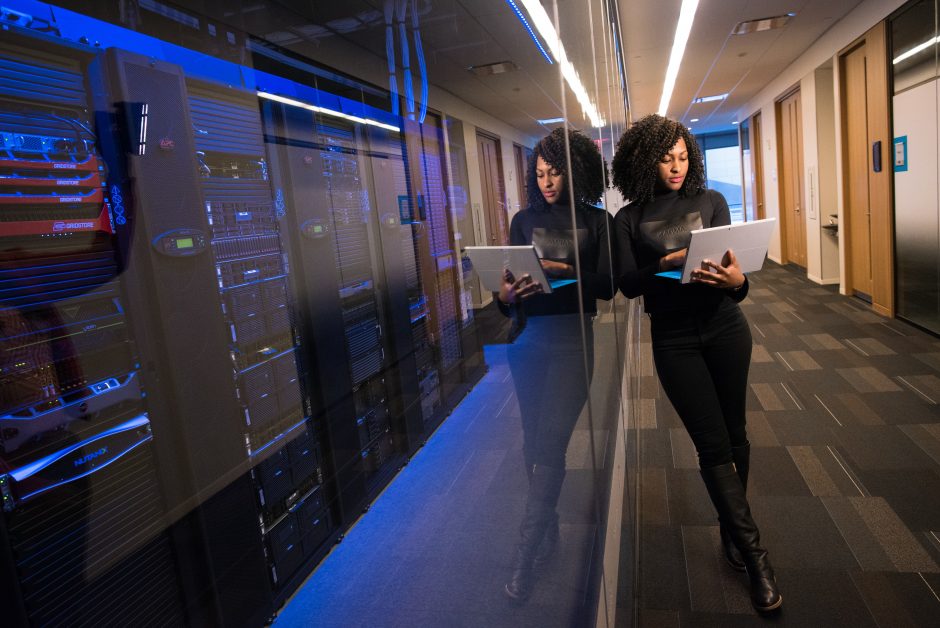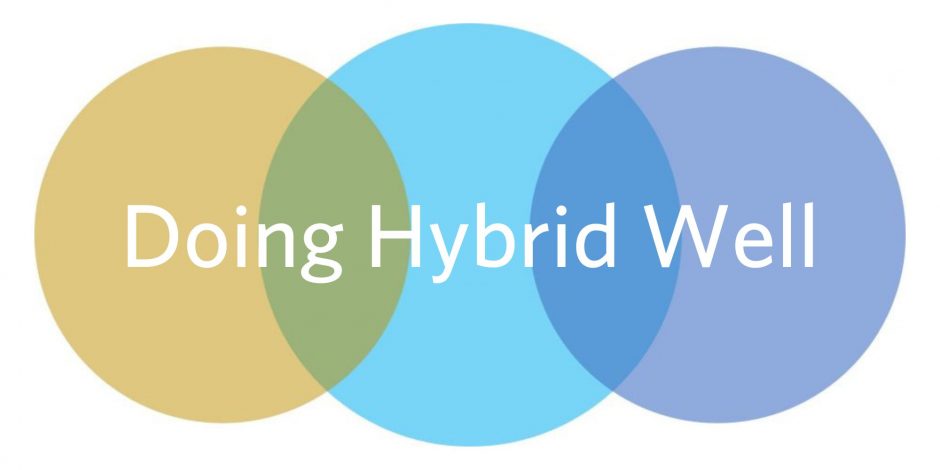While the landscape of work continues to evolve, much of what we know about effective workplaces and leadership remains unchanged, despite the shift to hybrid work. Instead of calling for new skills and behaviours, this new work environment requires leaders to be more intentional in how they apply leadership skills and pay particular attention to effectively utilizing in person time to nurture existing relationships and foster new connections.
These practical tips, actionable insights, and valuable resources will help you navigate the unique challenges, and leverage the opportunities, presented by hybrid work.
We also encourage you to talk to your colleagues to learn best practices and share challenges. Tap into the collective wisdom at FoM to shape the future of our work(place).
View:

+ Understand the Future of Work
Embracing the future of work is essential as we navigate the evolving landscape of the hybrid workplace. The following resources highlight the trends and insights shaping the future of work:
- Here’s how companies should approach hybrid working in 2023 | World Economic Forum | Article: Learn about how we can approach hybrid work more intentionally.
- Return to Office & the Future of Hybrid Work | Gallup | Video: Learn about research from Gallup on the most significant change impacting workers and their advice to leaders. (4 min)
- The Future of Hybrid Working | Gartner: This video breaks down the four modes of working within a hybrid working environment. (3.5 min)
- Leading Hybrid Teams: How Organizations Can Successfully Shift to the New World of Work | Centre for Creative Leadership | Webinar: Learn how to effectively lead hybrid teams by understanding the challenges, utilizing a research-based framework for effective teaming, and the importance of establishing team agreements and leading yourself. (1 hr)
- The Secrets to Implementing a Successful Hybrid Work Model | Gartner | Podcast: Learn about the current state of hybrid work and what a “human-centric” hybrid model is. (23 min)

+ Onboard Effectively
Effectively onboarding new team members in a hybrid workplace requires specific strategies. The following resources delve into strategies, best practices, and resources to ensure a seamless and engaging onboarding experience:
- Strategies for Onboarding in a Hybrid World | Microsoft | Article: Learn four onboarding strategies for a hybrid workplace.
- Onboarding in the Hybrid/Remote Workplace | LinkedIn Learning | Course: Learn five strategies to create an onboarding system to foster employee connection with you, their teammates, and the organization from day one. (21 min)
UBC provides resources to hiring managers, including an onboarding guide and checklist for new employees. Encourage new employees to register for the Welcome to UBC Orientation held periodically online and in person.
*if you experience any issues with accessing a link, check that you are logged in through your CWL

+ Create a Culture of Accountability
Creating a culture of accountability is a critical aspect of achieving success in the hybrid workplace. The following resources delve into strategies and best practices for setting goals, providing feedback, and evaluating performance in a remote and blended work environment:
- Measure Performance: Strategies for Remote and Hybrid Teams | Gallup | Article: Understand the complexity of measuring performance, learn three performance domains that describe and predict success in a role, and the important role managers play.
- A tool to support employee success | Workplace Strategies for Mental Health | Tool: A tool that supports employee success by providing a step-by-step process to assess stressors at work, develop strategies that support employee success, and help maintain a safe and productive workplace.
- How to Give Feedback – Especially When You’re Dreading it | Harvard Business Review | Video: Liane Davey, author of The Good Fight provides a four-step framework to deliver feedback with clarity. (11 min)
- Building Accountability into Your Culture | LinkedIn Learning | Course: Learn how to create a culture of accountability by developing accountability at the individual level and team level. (29 min)
- Compassionate Directness | LinkedIn Learning | Course: Learn the powerful combination of directness and compassion in effective communication and how to foster a culture that enhances clarity, productivity, and respects individuals’ humanity. (41 min)
- How to Hold a Coaching Conversation | Center for Creative Leadership | Article: Learn three important steps to engage in a coaching conversation that will transform everyday interactions into learning opportunities.
Review UBC resources on staff performance conversations and approaches.
*if you experience any issues with accessing a link, check that you are logged in through your CWL

+ Build Trust
Building trusting teams is foundational for collaboration and success in the hybrid workplace. These resources explore strategies and practices to foster trust, strengthen relationships, and cultivate a culture of psychological safety within your team:
- What Is Psychological Safety at Work? How Leaders Can Build Psychologically Safe Workplaces | Center for Creative Leadership | Article: Learn eight steps that will help you build greater psychological safety in the workplace, so your teams are more successful and engaged.
- Trusting Teams | Simon Sinek | Video: Learn about the importance of building trust to create an environment in which people can work at their natural best. (9m)
- The Anatomy of Trust | Dr. Brené Brown | Video: Learn about the seven attributes of trust that allows us to more clearly identify and address breaches of trust. (23 min)
- Building Trust | LinkedIn Learning | Course: Learn how to build trust with colleagues using three drivers to gauge your trustworthiness: competency, empathy, and authenticity. (1 hr)
- How Teams Can Meaningfully Connect Remotely | Simon Sinek | Video: Simon Sinek and his team model their weekly “huddle” designed to build relationships, connectivity, and trust in hybrid/remote teams.
*if you experience any issues with accessing a link, check that you are logged in through your CWL

+ Prioritize Your Own Learning
Prioritizing your development as a manager is important for adapting and excelling in the hybrid workplace. The following resources will support you in your growth as a manager:
- LinkedIn Learning: Get on-demand access to instructional videos around relevant themes and skills necessary for managing hybrid teams.
- Workplace Learning Catalog: UBC’s Workplace Learning Catalog is your go-to resource for exploring and enrolling in courses offered or recommended by the University.
- UBC Coaching Program: UBC offers a limited number of free one-on-one coaching sessions to all regular paid faculty and staff. Harness the expertise of a professional coach to navigate the intricacies of hybrid work and address common workplace issues you may face in your role.
The Leaders Edge is a UBC newsletter that features content related to managing in a hybrid workplace and upcoming professional development opportunities. The newsletter is automatically sent to all managers with direct reports. If you have not received it, subscribe here.

+ Is Hybrid Right for Your Team?
Hybrid work arrangements must follow the UBC hybrid work program objectives, principles, guidelines, and considerations. Managers are expected to decide if hybrid work arrangements are suitable for specific employees and the whole team.
To assess whether a hybrid work arrangement is appropriate for your team, start by reviewing UBC’s decision-making resources and tips.
Every team is unique, and there may be other factors you need to consider. If you are uncertain about whether or how to implement a hybrid work model for your team, the Hybrid Work & Communication Toolkit can help you make this decision. You are not expected to have all the answers – the Toolkit provides a framework to explore what a hybrid work model may look like for your team and to collaboratively develop an approach.
UBC’s Hybrid work for leaders page will guide you through considerations and the steps to formalize this arrangement and how to review, change or end an arrangement.
Managers are encouraged to access support and advice from their Department or Centre Administrator, if needed.

+ Practice Inclusive Leadership
Diverse and inclusive workplaces are ones with highly innovative and collaborative teams. These resources provide strategies and insights to help lead inclusively to promote equity and create an environment where every team member feels valued and empowered.
- Hybrid work: Making it fit with your diversity, equity, and inclusion strategy | McKinsey | Article: Learn the three inclusion practices that employees want organizations to improve as part of a hybrid work model.
- Inclusive Leadership: Steps to Take to Get It Right | Centre for Creative Leadership | Article: Learn seven acts of inclusion to show more compassion and create a more inclusive culture.
- How Aspects of Identity Can Affect the Way You Lead & Work With Others | Centre for Creative Leadership | Webinar: Learn about the relationship between various aspects of identity and unintended bias, and how to shift your perspective to move past awareness to taking action to cultivate greater equity, diversity, and inclusion. (30 min)
- Leading and managing safe, healthy and inclusive communities at UBC | LinkedIn Learning | Learning Path: Discover a learning path specifically curated for UBC leaders to support the creation and maintenance of healthy and inclusive leadership practices. (4 hr)
*if you experience any issues with accessing a link, check that you are logged in through your CWL

+ Show Appreciation
Recognizing and appreciating the contributions of your team fosters motivation, engagement, and a positive work culture, and is especially critical in a hybrid workplace. These resources explore UBC and FoM’s award programs and provide strategies to acknowledge and celebrate the achievements and efforts of your employees:
- How to Build a Culture of Appreciation as a Manager | LinkedIn Learning | Course: Learn practical, evidence-based approach to recognition that can help your employees feel valued and respected. (33 min)
- Why Employees Need Both Recognition and Appreciation | HBR | Article: Learn the difference between recognition and appreciation and why both are important.
- How to Express More Gratitude at Work & Why Gratitude in Leadership Is Important | Centre for Creative Leadership | Article: Learn the importance of gratitude in the workplace and tips to get better at doing it.
- Creating a Culture of Recognition | Great Place To Work | Article: Learn why recognition matters, and how to create a meaningful recognition culture.
- 50 Rewards And Recognition Ideas To Boost Employee Recognition | VantageCircle | Blog: Consider these creative ideas for recognizing your employees.
Learn more about UBC and FoM opportunities for formal recognition.
*if you experience any issues with accessing a link, check that you are logged in through your CWL

+ Foster Wellbeing and Safety
Supporting the wellbeing and safety of your team members is essential. This section provides valuable resources, insights, and best practices to support wellbeing, create a safe working environment, and cultivate a positive and productive team culture:
- How to prioritise the wellbeing of your people in a hybrid workplace | Hays | Article: Explore eight steps that you can take to prioritize the health and wellbeing of your team.
- Leading Well – Strengthening Mental Health and Psychological Safety for UBC Leaders | LinkedIn Learning | Learning Path: Make your way through a learning path specifically curated to support UBC leaders in building personal wellbeing and team resilience. (7 hr)
- Talking About Mental Health at Work – Can I Speak to Your Manager? | TEDx | Video: Listen to Mark Bailey share his own experiences with mental health challenges at work, and effective ways for managers to address these kinds of challenges when brought to their attention.
Safety
- Safety training for hybrid work: Hybrid work requires key attention to safety at the remote worksite – WorkSafeBC considers it an extension of an employee’s workplace. Ensure you and your employees have completed the Hybrid Work Safety Training.
- Working Alone or In Isolation: Learn what you need to have in place if a worker is working alone or in isolation at work or while working at home.
Learn about the wide range of resources UBC provides to managers to support team wellbeing and to cultivate a healthy work environment. Specifically, UBC provides extensive resources to help you manage mental health challenges for your team and for yourself.
*if you experience any issues with accessing a link, check that you are logged in through your CWL
